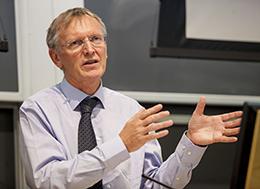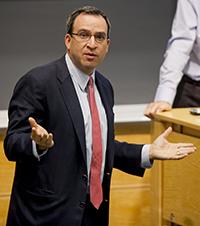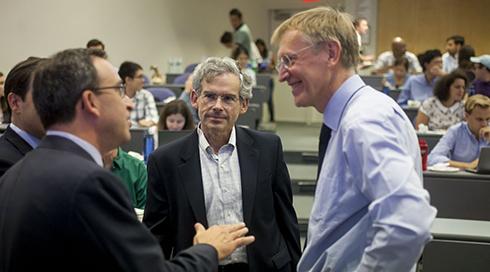Environmental Commissioner of the EU Addresses Global Responsibility For a Sustainable Economy
Dr. Janez Potočnik, the EU Commissioner for the Environment, Reframes the Debate Between Environmental Sustainability and Economic Solvency in a Guest Lecture at Columbia Law School.
New York, September 17, 2014—With the global population expected to explode to an estimated 9 billion by 2045 and push the demand for natural resources beyond the limit, developed powers including the U.S. and Europe have a responsibility to become the model for sustainable economic and environmental policy, the EU’s environmental commissioner, Dr. Janez Potočnik, said during a Sept. 10 guest lecture at Columbia Law School.
| Dr. Janez Potočnik, environmental commissioner of the European Union, talks to students as a guest speaker at a weekly class on the environment and business. |
Potočnik spoke to students in Environmental Issues in Business Transactions, a class taught by lecturers and practicing environmental attorneys Ken Rivlin and Matthew Morreale. Potočnik explained that the EU’s current plan to eliminate waste completely by 2030 through a multi-pronged approach including mandatory recycling, composting, and other tactics is not just good policy—it’s an economic necessity.
"It’s very simple. The way we are living, the way we consume, the way we produce—we have to change,” said Potočnik, a noted Slovenian economist who was appointed head of the negotiating team in 1998 that worked to help Slovenia gain admission to the EU. “We have an enormous responsibility."
Potočnik went on to become a member of the European Commission in 2004 and spent the next five years overseeing science and research before becoming the EU’s highest-ranking environmental official in 2010. He was presented with the United Nations' Champions of the Earth Award in September 2013.
| Ken Rivlin, a noted environmental attorney and lecturer, welcomes Potočnik to his class. |
In an introduction to Potočnik’s 45-minute speech, Rivlin, who heads Allen & Overy's Global Environmental Law Group, U.S. Environmental and Regulatory Law Group, and U.S. Pro Bono Program, praised the commissioner’s role at the front lines of the environmental movement.
"Europe has overtaken California and the U.S. as the world's leader in developing innovative environmental policy,” Rivlin said. “Commissioner Potočnik has been enormously successful in driving new legislative initiatives in Europe that will reduce waste, promote substantially more efficient resource use and provide a model for policies that are both environmentally and economically sustainable. He has been, and will continue to be, a strong voice in the global conversation on sustainability."
Potočnik said he takes issue with the long-held belief by some in business and government that environmental interests are in conflict with economic ones, explaining that they must be integrated in order to bring about a system that can support generations to come.
"The environment and the economy are two sides of the same coin, and it is high time we stop flipping that coin," he said.
The challenges to implementing system-wide change are manifold, he said, from long-entrenched business precepts to consumer behavior.
As an example, Potočnik said less than 10 percent of cellphones are recycled worldwide despite the fact that the estimated 100 million unused phones discarded each year contain more than 2.4 tons of gold, 25 tons of silver, 1 ton of palladium, and 900 tons of copper.
"If you just ask yourself: how many of the mobile phones are in your drawers, you will get the answer," Potočnik told students, adding that new approaches to energy-guzzling technologies—including cars—will be required to make efficiency gains.
While Potočnik supports the power of the market to keep consumers and the economy on track, he said some regulation is necessary to steer the market in the right direction.
"I am also a believer in innovation,” he said. “But innovation needs good regulation because you need to send innovation into the right direction."
| Professor Michael B. Gerrard, director of the Sabin Center for Climate Change Law, confers with Potočnik and Rivlin before the lecture. |


